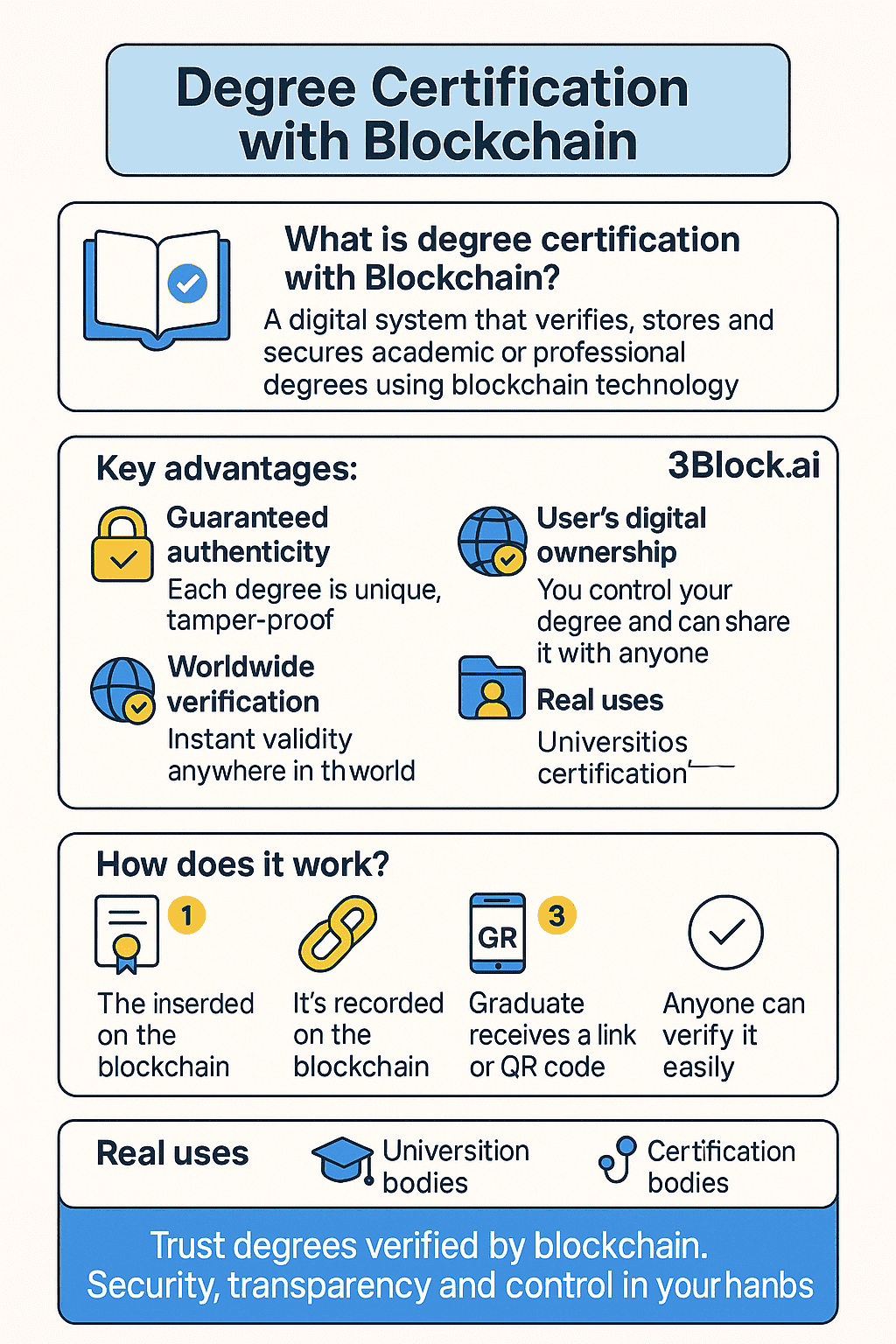With blockchain technology, your university degree is impossible to forge. You can verify its authenticity in seconds from anywhere with any device. You no longer need to visit institutions or places where they provide certified copies of your degree. This reality already exists, it's the reality that's transforming the educational landscape thanks to the national blockchain degree system.
Why do we Need a revolution in academic certification?
University degree forgery is a problem that's commonplace in many parts of the world and seriously undermines the credibility of educational institutions. The traditional process has several shortcomings and weaknesses that allow certificates to be manipulated or create opportunities for document fraud.
The traditional model has three fundamental pillars for requesting a degree: students who apply for their diploma, the educational institution that validates approved subjects and issues the degree, and the Ministry of Education that certifies the document's validity.
In its current form, the process lacks mechanisms to guarantee data integrity, especially when the degree passes through various entities during processing. It's crucial to provide a legalised copy to present the document, and this requires time and costs.
How does university degree certification work with blockchain?
University degree certification with blockchain simply means issuing and registering the academic degree within the blockchain to leverage its authenticity, security, and accessibility.
The simplified process
The operation is very simple. When the university issues the degree, it creates a "timestamp" that generates a unique cryptographic digest (hash) of the document. This hash is identified as an impossible-to-modify fingerprint, and this hash is permanently stored in the blockchain.
Students receive an electronic copy of their degree with the same legal validity as the physical document. They can share this copy with institutions instantly and from any device, through a QR code or direct link. With this process, we eliminate all the bureaucracy and administrative procedures involved in obtaining the degree.
What does it mean for the electronic degree to be on the blockchain?
When a degree is registered within the blockchain, it immediately gains three important pillars: traceability, immutability, and transparency. Everything within the blockchain is cryptographically protected, and each network node has a copy of the data that cannot be modified.
This means the document becomes literally "unhackable" and impossible to forge, as any attempt at alteration would be immediately detected by the network.

Benefits of university degree certification with blockchain
For universities
Educational institutions have significant advantages when implementing blockchain technology:
- Fraud prevention: Complete control over the authenticity of issued accreditations.
- Significant savings: No financial costs and automatic speed in terms of management.
- Total transparency: Open and completely auditable certification system that anyone can view.
- Regulatory compliance: Satisfaction of regulations regarding citizen access to electronic documents.
- Institutional prestige: Positioning as a technologically advanced institution.
Benefits of electronic university degrees for students
Graduates experience dramatic improvements in their experience:
- Instant access: Degree availability from any device, at any time.
- Economic savings: Elimination of administrative costs and travel.
- Complete legal validity: Same legitimacy as the traditional physical document.
- Immediate verification: Employers can confirm authenticity instantly.
- International mobility: Global recognition without administrative barriers.
- Digital portability: Integration with LinkedIn and professional platforms.
Which institutions are using it?
Blockchain technology implemented in educational institutions is growing in places like Latin America and Spain.
Colombia: regional pioneer
The National University of Colombia is the first to begin having degrees within the blockchain, in places such as:
- Fundación Universitaria Sanitas
- Universidad Konrad Lorenz
- Universidad Autónoma de Occidente
- Colegio Anglo Colombiano
Mexico: technological leadership
Tecnológico de Monterrey has been much talked about in Mexico as digital professional degrees were registered on the blockchain. The Technological University of Mexico (UNITEC) and the University of Valle de México (UVM) have issued more than 90,000 degrees using this technology.
Peru: accelerated adoption
The National University of Engineering (UNI) has more than 4,000 degrees with blockchain, followed by the Peruvian University Cayetano Heredia and the College of Translators of Peru.
Spain: european innovation
The University of Murcia, together with the Polytechnic University of Cartagena and the Catholic University San Antonio, are applying blockchain validation processes, participating in the BLUE Project of CRUE aligned with the European EBSI initiative.
Benefits of electronic university degrees for universities
Implementation doesn't require complex additional infrastructure, offering immediate integration with multiple operational advantages:
- Improved service: Universities provide their students with an enhanced user experience and security guarantees when obtaining their degree.
- Total control: Institutions maintain notable authority as they are the ones who issue each degree.
- Regulatory compliance: A series of regulations regarding citizen access to documents to increase security.
- Competitive advantage: Innovation by the educational institution for having more advanced technology, thus increasing student adoption.
The future of academic certification
The trend of implementing blockchain in this academic sector is becoming an important decision in many countries and institutions. It's a very important innovation in how we conceive academic certification. Blockchain technology isn't limited to cryptocurrencies; it can enter all necessary markets, which gives it even more potential, the technology is also beginning to be implemented in the voting systems of electoral processes, for example, as well as in large companies that also use it.
Emerging National Projects
Initiatives like Blockchain Federal Argentina (BFA), an open and participatory multi-service platform designed to integrate blockchain services and applications, demonstrate governmental commitment to this technology.
Development of digital document portfolios so that holders can have access, thus creating a system completely controlled by the user.
Practical Implementation: Easier Than You Imagine
Implementing blockchain for university degrees doesn't require very advanced technical knowledge. There are platforms that offer interfaces that allow you to start uploading digital certificates immediately.
Students can import their degrees from any device and store them on the same blockchain alongside other credentials from different issuers.
The Revolution Has Already Begun
The national blockchain degree system is a reality that's increasingly seen in more places, more countries, and more institutions. Universities that begin implementing the technology will have great advantages and will bring more adoption and prestige to it, as students will enjoy a safer, more efficient, and modern educational experience.
What's important here is when you'll start taking the leap towards this constantly growing sector. The benefits and security are clear, and there are already institutions that have proven it.
Are you ready to be part of this educational revolution that's redefining trust in academic credentials globally?
